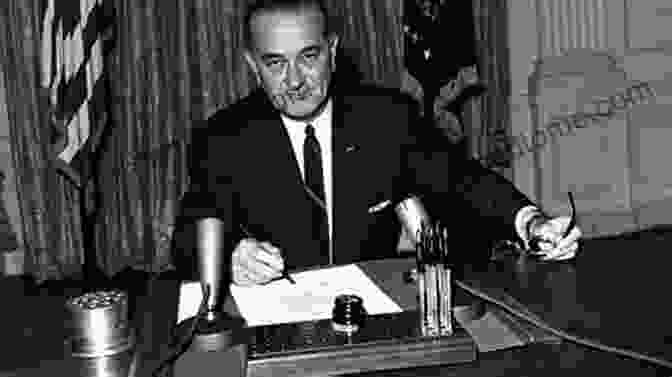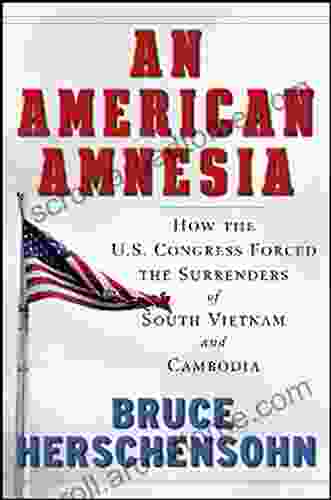How the U.S. Congress Forced the Surrenders of South Vietnam and Cambodia

By [Author's Name]
The Vietnam War was a long and bloody conflict that ultimately ended with the surrender of South Vietnam and Cambodia to communist forces. While the American public has long been aware of the role that the U.S. military played in the war, few people know that Congress also played a critical role in forcing the surrenders. In this article, we will explore the ways in which Congress contributed to the fall of South Vietnam and Cambodia.
4.5 out of 5
| Language | : | English |
| File size | : | 4162 KB |
| Text-to-Speech | : | Enabled |
| Screen Reader | : | Supported |
| Enhanced typesetting | : | Enabled |
| Word Wise | : | Enabled |
| Print length | : | 181 pages |
| Lending | : | Enabled |
The Gulf of Tonkin Resolution
One of the most significant events in the lead-up to the Vietnam War was the passage of the Gulf of Tonkin Resolution by Congress in 1964. This resolution gave President Lyndon Johnson broad authority to use military force in Southeast Asia without a formal declaration of war. The resolution was passed in response to two alleged attacks on U.S. ships in the Gulf of Tonkin, but many historians believe that these attacks were either exaggerated or fabricated.
The Gulf of Tonkin Resolution had a profound impact on the course of the Vietnam War. It gave Johnson the authority to escalate the conflict without having to seek approval from Congress again. This led to a dramatic increase in the number of U.S. troops in Vietnam and a corresponding increase in the number of casualties.

The Anti-War Movement
As the Vietnam War dragged on, the American public grew increasingly disillusioned with the conflict. This disillusionment was fueled by a number of factors, including the high number of casualties, the lack of progress on the battlefield, and the growing realization that the war was unwinnable. The anti-war movement, which had been relatively small in its early stages, began to grow exponentially in the late 1960s.
The anti-war movement had a significant impact on the Vietnam War. It helped to raise public awareness of the war's costs and futility, and it put pressure on Congress to end the conflict. In 1973, Congress passed the War Powers Act, which limited the president's ability to wage war without congressional approval.

The Fall of South Vietnam
The fall of South Vietnam to communist forces in 1975 was a major turning point in the Vietnam War. The collapse of the South Vietnamese government was due to a number of factors, including the withdrawal of U.S. troops, the corruption and incompetence of the South Vietnamese government, and the military superiority of the North Vietnamese. However, Congress also played a role in the fall of South Vietnam.
In 1973, Congress passed the Case-Church Amendment, which prohibited the U.S. from providing any further military assistance to South Vietnam. This amendment was a major blow to the South Vietnamese government, which was heavily dependent on U.S. aid. The Case-Church Amendment effectively ended U.S. involvement in the Vietnam War and paved the way for the eventual collapse of South Vietnam.

The Fall of Cambodia
The fall of Cambodia to communist forces in 1975 was another major turning point in the Vietnam War. The collapse of the Cambodian government was due to a number of factors, including the withdrawal of U.S. troops, the corruption and incompetence of the Cambodian government, and the military superiority of the Khmer Rouge. However, Congress also played a role in the fall of Cambodia.
In 1973, Congress passed the Cooper-Church Amendment, which prohibited the U.S. from providing any further military assistance to Cambodia. This amendment was a major blow to the Cambodian government, which was heavily dependent on U.S. aid. The Cooper-Church Amendment effectively ended U.S. involvement in the Cambodian Civil War and paved the way for the eventual collapse of Cambodia.

Congress played a significant role in the fall of South Vietnam and Cambodia. The Gulf of Tonkin Resolution gave President Johnson broad authority to escalate the Vietnam War without having to seek approval from Congress again. The anti-war movement helped to raise public awareness of the war's costs and futility, and it put pressure on Congress to end the conflict. The Case-Church Amendment and the Cooper-Church Amendment prohibited the U.S. from providing any further military assistance to South Vietnam and Cambodia, which effectively ended U.S. involvement in both conflicts.
The fall of South Vietnam and Cambodia was a tragedy for the people of those countries. It also had a profound impact on the United States. The war left a deep scar on the American psyche, and it led to a loss of faith in the government's ability to make wise decisions about foreign policy.
4.5 out of 5
| Language | : | English |
| File size | : | 4162 KB |
| Text-to-Speech | : | Enabled |
| Screen Reader | : | Supported |
| Enhanced typesetting | : | Enabled |
| Word Wise | : | Enabled |
| Print length | : | 181 pages |
| Lending | : | Enabled |
Do you want to contribute by writing guest posts on this blog?
Please contact us and send us a resume of previous articles that you have written.
 Book
Book Novel
Novel Page
Page Chapter
Chapter Text
Text Story
Story Genre
Genre Reader
Reader Library
Library Paperback
Paperback E-book
E-book Magazine
Magazine Newspaper
Newspaper Paragraph
Paragraph Sentence
Sentence Bookmark
Bookmark Shelf
Shelf Glossary
Glossary Bibliography
Bibliography Foreword
Foreword Preface
Preface Synopsis
Synopsis Annotation
Annotation Footnote
Footnote Manuscript
Manuscript Scroll
Scroll Codex
Codex Tome
Tome Bestseller
Bestseller Classics
Classics Library card
Library card Narrative
Narrative Biography
Biography Autobiography
Autobiography Memoir
Memoir Reference
Reference Encyclopedia
Encyclopedia Bryan Cook
Bryan Cook C M Barrett
C M Barrett Josh Bernstein
Josh Bernstein Carl J Schramm
Carl J Schramm Marit Larsen
Marit Larsen C H Spurgeon
C H Spurgeon Carlo Strenger
Carlo Strenger Can Akdeniz
Can Akdeniz Robert I Field
Robert I Field Fabrizio Benedetti
Fabrizio Benedetti Carolyn Lee
Carolyn Lee Carrie A Picardi
Carrie A Picardi Caitlin Rother
Caitlin Rother Lonnie Pack
Lonnie Pack Bruce R Hopkins
Bruce R Hopkins Kristen Ball
Kristen Ball John Lemay
John Lemay David R Kopacz
David R Kopacz Satpreet Singh
Satpreet Singh Bronwen Dickey
Bronwen Dickey
Light bulbAdvertise smarter! Our strategic ad space ensures maximum exposure. Reserve your spot today!

 Griffin MitchellQuantum Social Change for a Thriving World: Unveiling the Transformative...
Griffin MitchellQuantum Social Change for a Thriving World: Unveiling the Transformative...
 Chandler WardUnveiling the World's Most Inspiring Floral Guide: The Queen of Flowers: Life...
Chandler WardUnveiling the World's Most Inspiring Floral Guide: The Queen of Flowers: Life...
 Henry Wadsworth LongfellowThe Art Of Vector Graphics Design And Illustration In Illustrator
Henry Wadsworth LongfellowThe Art Of Vector Graphics Design And Illustration In Illustrator
 Colton CarterUnlocking the Secrets of Student Health: The Essential Handbook for School...
Colton CarterUnlocking the Secrets of Student Health: The Essential Handbook for School... August HayesFollow ·8.4k
August HayesFollow ·8.4k Amir SimmonsFollow ·17.9k
Amir SimmonsFollow ·17.9k Haruki MurakamiFollow ·4.5k
Haruki MurakamiFollow ·4.5k John SteinbeckFollow ·7.5k
John SteinbeckFollow ·7.5k Eugene ScottFollow ·16.2k
Eugene ScottFollow ·16.2k Greg CoxFollow ·13.6k
Greg CoxFollow ·13.6k W.H. AudenFollow ·10k
W.H. AudenFollow ·10k Preston SimmonsFollow ·17.7k
Preston SimmonsFollow ·17.7k

 Shawn Reed
Shawn ReedEmbark on a Transformative Journey: Discover Ritual...
Delve into the Enigmatic World of...

 Connor Mitchell
Connor MitchellUnleash Your Soul: A Journey to Less Noise, More Soul
Embrace the Power of Silence...

 Derek Cook
Derek CookRitual Theory, Ritual Practice: Unlocking the Secrets of...
Rituals have been an...

 Evan Hayes
Evan HayesStop the Itch: Simple Steps to Lasting Relief
Itching, an...

 Herman Mitchell
Herman MitchellThe Ultimate Premarital Guide: Your Essential Wedding...
Congratulations on your engagement! This is...

 DeShawn Powell
DeShawn PowellUnlocking the Enigma of the Mantle: A Deep Dive into "The...
Our planet,...
4.5 out of 5
| Language | : | English |
| File size | : | 4162 KB |
| Text-to-Speech | : | Enabled |
| Screen Reader | : | Supported |
| Enhanced typesetting | : | Enabled |
| Word Wise | : | Enabled |
| Print length | : | 181 pages |
| Lending | : | Enabled |




